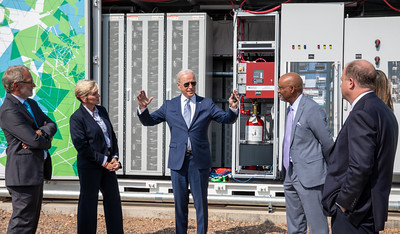Last week, the Biden Administration announced a $24M funding opportunity for community colleges, trade unions, and labor management partnerships to create training and education opportunities for clean energy jobs. The administration is targeting employment opportunities that require training but not a four-year degree.
Under the program, the US Department of Energy will provide funding to create Industrial Assessment Centers (IAC). An IAC’s primary mission is to conduct energy assessments for small- and medium-sized businesses. The goal of the assessment is to identify operational processes or environmental circumstances that over-consume energy, cost more, or diminish productivity. These centers typically work with businesses with fewer than 500 employees.
Once an assessment is complete, the site will provide opportunities for students, apprentices, and existing workers to implement equipment and strategies designed to reduce energy consumption.
The program provides three separate funding opportunities, including one-year planning and capacity building grants; three-year grants for applicants that are already in the program or that are able to use existing programs to become a designated IAC; and three-year grants aimed at consortia who can establish multiple IACs simultaneously.
Additionally, the DOE intends to fund the program in subsequent years to assist eligible organizations to scale their participation.
The Department of Energy, headed by former Michigan Governor Jennifer Granholm emphasized that the jobs the IACs will create will be high-wage, high-demand jobs that do not require a four-year degree.
This is a good funding opportunity for community colleges who need to find ways to introduce new programs of study, meaningfully enhance their existing courses, and create pathways into clean energy jobs in Michigan.
Clean Energy Adoption Is Not An Option
There is little doubt that Michigan – like all other states – will need to develop clean energy options. Late last year, Governor Gretchen Whitmer signed into law measures that require Michigan’s energy providers to cease the use of carbon-based energy production by 2040. That’s a mere 16 years away, and it will take time to develop clean energy infrastructure.
In the meantime, it is critical to help consumers (residential and commercial) identify areas in which they can reduce their energy consumption.
This is a little ironic for Washtenaw Community College, which has led all Michigan community colleges in energy consumption for years. It has only been in the very recent past that WCC has taken any impactful steps to reduce its own energy consumption on campus. Its chronic failure to modernize its HVAC systems and building envelopes has unnecessarily cost the taxpayers millions of dollars and diverted funds away from instruction to heating, cooling, and lighting.
WCC can choose to be a leader in clean energy in both practice and in job creation, or it can settle for being dragged along, forced to comply with a changing energy consumption landscape.
Photo Credit: National Renewable Energy Lab
















